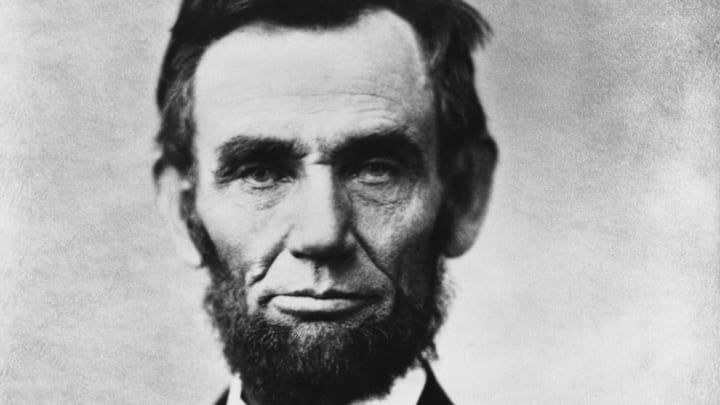U.S. PRESIDENTS (1809–1865); HODGENVILLE, KENTUCKY
Abraham Lincoln is often ranked as one of the United States’s most important presidents for his role in steering the country through the Civil War and his insistence on abolishing slavery, culminating in the Emancipation Proclamation. Read on for some of his most famous quotes and facts about his family life, his iconic look (including that stovepipe hat), and his eventual assassination.
1. Abraham Lincoln and his wife, Mary Todd, lost three of their four children early on.
The Lincolns had four sons:
- Robert
- Eddie
- Willie
- Tad
Eddie died at age 3 of "chronic consumption" (likely tuberculosis), and Willie was born 10 months later. In 1862, while the family was in the White House, 11-year-old Willie died of typhoid fever. Little Tad, who eventually recovered from the typhoid fever he had at the same time as Willie, survived his father but died in 1871 at age 18, possibly from a heart condition. Oldest brother Robert was the only one to survive to adulthood, and, in his father’s footsteps, had a long career in politics, serving as both the Secretary of War and Ambassador to the UK.
2. LINCOLN’S HEIGHT WAS FORMIDABLE, EVEN BEFORE HE PUT ON HIS FAMOUS TOP HAT.

At 6 foot 4 inches, Lincoln remains the tallest president in U.S. history. And one of his iconic top hats—the one he wore (which was 7 to 8 inches tall) to Ford’s Theatre the night of his assassination—is a permanent piece of the Smithsonian collection.
3. Lincoln’s presidency truly marked the beginning of the Civil War.

Lincoln won the presidential election of 1860 without carrying any Southern states, and politicians from the region immediately became more open when discussing rebellion. By the time Lincoln was inaugurated in March 1861, seven states had seceded with more to follow after. The Confederacy ratified their own constitution within the week, and the first battle of the Civil War broke out at Fort Sumter in Charleston, South Carolina, just weeks later.
4. Abraham Lincoln was the first Republican president.

When the Republican Party was formed in 1854, it was in response to the repeal of the Missouri Compromise, which opened the Kansas and Nebraska territories up as possible future slave states. By 1860, the Northern abolitionist-filled party won control of both the House and Senate and the White House. Lincoln issued the Emancipation Proclamation on New Year’s Day 1863, and the Republican Congress pushed the Thirteenth Amendment through in 1865, which effectively banned slavery.
5. Abraham Lincoln was the first president to be assassinated.

On April 14, 1865, Lincoln was shot by actor John Wilkes Booth while the president was watching a play at Ford’s Theatre. The president would be pronounced dead in the early hours of April 15. Lincoln was 56 years old when he was assassinated, but he wasn’t the only target that night—Booth had conspired with others to simultaneously attack Vice President Andrew Johnson and Secretary of State William Seward. Booth was the only one who succeeded in his mission that night.
6. It took more than 50 years for the Lincoln Memorial to be approved and completed.

It’s now the most visited monument in Washington D.C., but it took decades of squabbling before the Lincoln Memorial was built. Though Congress had formed the National Lincoln Monument Association to begin planning in 1867, construction wouldn’t actually begin until 1914. When the monument finally opened to the public in 1922, Robert Todd Lincoln was in attendance.
7. Lincoln’s Gettysburg Address took about three minutes to deliver.

When Abraham Lincoln made his famous Gettysburg Address on November 19, 1863, his words weren’t supposed to live on in history. In fact, the 16th president wasn’t even the primary speaker that day; that honor went to a scholar and statesman named Edward Everett, who was touted as one of the country’s great orators at the time.
At just around 270 words, Lincoln’s speech took about three minutes to make, but it’s lived on ever since as a shining example of impactful brevity. Everett’s speech, on the other hand, came in at 13,000 words and took over two hours to deliver—and chances are, most Americans will never know it happened at all. Fittingly, when addressing the crowd that day, Lincoln said, "the world will little note, nor long remember what we say here."
Turns out he was right—at least about one of the speeches.
Famous Abraham Lincoln Quotes:
- "Nearly all men can stand adversity, but if you want to test a man’s character, give him power."
- "Those who deny freedom to others, deserve it not for themselves."
- "Be sure you put your feet in the right place, then stand firm."
- "I have always found that mercy bears richer fruits than strict justice."
